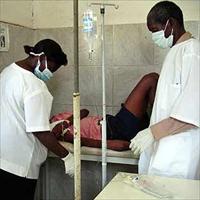SUDAN: Whooping cough outbreak in West Darfur

A dramatic rise in whooping cough cases has been reported near El Geneina, capital of the Sudanese state of West Darfur, but insecurity has made it difficult for medical personnel to reach the affected populations, according to an international NGO.
Two cases of the disease (also known as pertussis) were reported in Kondobe, a remote village 20km north of El Geneina, a fortnight ago, according to the NGO,
Medair
. But by last week, the number had risen to 147 while another 11 cases were reported in Bir Dagaig village, 10km further north.
"Whooping cough is a particularly dangerous disease," David Sauter, Medair’s operations manager, said in a statement. "It is an important cause of infant death around the world."
Many of those affected were over five, including adults, suggesting that recent immunisation had protected some of the younger children. But the general population was at greater risk because they have had little access to routine immunisation.
"Restrictions on helicopter flights mean we have been unable to visit this area since mid-December," said Medair's Simon Manning. "But we hope that a team of medical staff will be able to visit Kondobe on a UN helicopter flight later this week.
"Many of the people in Kondobe used to live around Bir Dagaig, until insecurity forced them to flee their homes last year," he added. "They are now staying with relatives or living under plastic shelters because of the cold season. These poor living conditions facilitate the spread of viruses and bacteria, such as whooping cough."
According to the
UN World Health Organization
, whooping cough is a bacterial disease of the respiratory tract. It is most dangerous in infants and is spread very easily from child to child in droplets produced by coughing or sneezing.
In 2003, more than 100 children, mostly younger than five, died from a suspected outbreak of whooping cough in Kimatong Budi county, Equatoria state – 126 within four weeks from 20 August until 22 September.
 Back and Next - Back and Next
Back and Next - Back and Next See Also - See Also
See Also - See Also